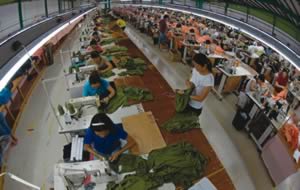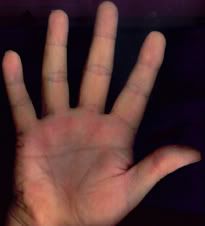
Brief History of the Marianas
The Commonwealth of the Northern Mariana Islands is located just north of the U.S. territory of Guam.
The U.S. military seized the 14 islands from Japan during World War II. The air base from which the atomic bombs dropped on Hiroshima and Nagasaki were delivered was located there. Following the war, the islands, consisting of an indigenous population of fisherman and subsistence farmers, were administered as a United Nations territory by the United States. In 1975 the people of the islands voted to become a U.S. Commonwealth. This designation allowed manufacturers there to advertise their goods as “Made In U.S.A.” It also made the people U.S. Citizens living under U.S. laws.
But two major exceptions to these laws have allowed the current desperate situation for workers in the Marianas to develop. An exemption was given for the mandated minimum wage requirements of the Fair Labor Standards Act. Also exemptions were given from most provisions of the Immigration and Nationality Act.
Setting the Stage
The minimum wage exemption allowed the islands to set their own minimum wages which currently average $3.05/hr. The immigration exemptions have allowed garment manufacturers to import workers under the “Guest Worker” designation, which means these workers can remain as long as needed, but they are not eligible for U.S. citizenship. Thousands of these workers, mostly Chinese women, have been brought to the islands, after being told they were going to America, only to find themselves in something too much like indentured servitude. Due to the gutting of the Immigration Act, if they complain to their employer, they can be fired as well as deported. There are no Labor Unions and the local Labor and Immigration offices are so underfunded it can take up to a year to get a case heard. There have been no tariffs or quotas on the products these companies export, which has been an advantage for the Marianas over other countries in the area.
This advantage and ability to keep costs so low has lead to an atmosphere where the local government and the manufacturers have fought long and hard to maintain the status quo.
Made In America

Most shoppers, upon seeing the “Made In U.S.A.” label, immediately associate it with well made products, produced under our current laws and regulations. They haven’t a clue that the items are actually made in a sweatshop in Saipan under slave labor conditions.
Such popular labels as J.Jill, Elie Tahari and Ann Taylor are produced at the RIFU garment factory where approximately 300 workers will produce 15,000 garments in a single day. These brand names don’t own their own factories and subcontract the work out to RIFU and similar factories scattered throughout the islands. Brands such as Liz Claiborne, The Gap, Ralph Lauren and others are factory owners. At their peak these companies collectively export over $1 billion wholesale annually which retails for twice that amount.
All of it produced under some of the world’s worst working conditions.
Bring in the Slaves
Recruiters fan out through the big city slums and rural villages of poor Asian countries looking for workers. For a fee of up to $7,000 they offer a one year job contract which is renewable by the employer. This is a small fortune in that part of the world and many of the recruits borrow from lenders who charge as much as 20% interest, happy to pay the fees because they think they are going to America, where wages are high and the laws are good. They go to make money to send their children to school and enrich their families, only to find it is a scam.
Once they arrive they must not only pay back the recruitment fee, but factory-provided housing barracks and food expenses. These add another $2,500 for the year. Many choose cheaper housing consisting of corrugated sheet metal shanties shared with others. With the low wages it is impossible for them cover expenses with normal working hours therefore they are forced to work overtime. 52 forty-hour weeks equals 2080 hours. At $3.05/hour that is only $6,344 for the year -- far short of what the worker owes. They work six and seven day weeks, sometimes as much as twenty hours a day in their efforts to clear their debt. If they complain, they are punished by not being allowed to work overtime. Quotas are set for a day’s production and if the worker runs out of time prior to filling the quota they must complete the work at no additional pay. In many instances paychecks aren’t honored. Some have worked up to five months without pay. Even after two years, there are those who still aren’t close to clearing their debt, let alone making the money they need to better their lives. Most will not speak out about conditions, fearful of losing their jobs, and of threats made against them and their families by those who loaned them the money to find themselves living and working under these conditions to begin with.
As a comparison, U.S. military personnel have a per diem of $238.
Another burgeoning industry on the islands is sex tourism. It is estimated that about 90% of the prostitutes in Saipan are former garment workers. For $50 the American sailors and Asian businessmen can go home with a woman for the night. The red-light district is bursting with strip clubs and massage parlors where these women work, oftentimes locked in during the day, unable to escape. Others who had come seeking jobs, such as waitresses and dancers, have been forced into the sex trade as well. When they become pregnant, some women are deported back to China, or taken to a local illegal abortion clinic. In some cases, to keep job and baby, women may be allowed to sign affidavits declaring they will cover all medical costs of the pregnancy.
Anybody Helping?
Allen Stayman, who at one time led the Interior Department's Office of Insular Affairs, has tried to help the workers of the Marianas. In his position there he tried to follow a congressional dictate and negotiate with the Marianas to bring them in line with the U.S. standards. In so doing he earned the wrath of people in the shadows who would later bring him grief.
Since 1995 over 29 bills have been presented to the Senate by Senators Frank Murkowski (R-Ak.) and Ted Kennedy (D-Mass.), as well as Representatives George Miller (D-Ca.) and David Bonier (D-Mi.). Some of these bills were to raise minimum wage, others to stop the use of the “Made in USA” label and offer immigration reform. The Senate voted unanimously on three occasions for Murkowski’s immigration and wage reform bills. An additional bill by Bob Franks (R-NJ) in 1999 had a large majority of the house members, 243 in all, co-sponsoring the bill. Despite these strong showings, so far they have all died in the House Resources Committee… at the hands of a Georgetown-educated lawyer and a disgraced Texas Congressman.
Enter Abramoff and DeLay

 In 1995, while working at the Preston Gates Ellis & Rouvelas Meeds law firm, Jack Abramoff and his team were hired as lobbyists for the Commonwealth of the Northern Mariana Islands. The situation on the islands was coming to a boil and the Clinton administration, with certain members of congress, were pressing hard for elimination of the islands’ exemptions from minimum wage and immigration rules.
In 1995, while working at the Preston Gates Ellis & Rouvelas Meeds law firm, Jack Abramoff and his team were hired as lobbyists for the Commonwealth of the Northern Mariana Islands. The situation on the islands was coming to a boil and the Clinton administration, with certain members of congress, were pressing hard for elimination of the islands’ exemptions from minimum wage and immigration rules.Abramoff used his close ties with Republicans in the house, and by focusing his efforts on the House Resources Committee was successful in blocking all attempts at change for the Marianas even though both Republicans and Democrats were working hard for change.
Among the Republicans in the House whose attention was cultivated by Abramoff was majority whip Tom DeLay (R-Tx). As majority whip, DeLay was able to keep the bills off the floor so they never had a chance to be voted on. Abramoff even bragged to Marianas Governor Pedro P. Tenorio about how, between DeLay and himself, they had blocked every attempt to change the conditions in the Marianas.
DeLay, his wife and daughter were among over 100 Republican politicians, their families or associates who received all expense paid trips to the Marianas. They were treated to snorkeling and golfing trips and shown the ritzy areas so they could return home and remark on this perfect model of capitalism. Abramoff was in daily contact with DeLay’s associates, and in one period between 1996 and 1997 DeLay spoke directly with Abramoff over two dozen times, all concerning matters associated with the Marianas.
Once the G.W. Bush administration took over, the chore became even easier for Abramoff. Three of his associates obtained positions with the General Services Administration and in the Departments of Labor and Interior. Abramoff, with the help of the Republican National Committee chairman Ken Mehlman also went after Allen Stayman, having him fired within months of Bush’s inauguration, even though he had moved to the State Department and no longer dealt with the Marianas. By 2004 Abramoff had brought in $11 million in fees from the Marianas Government and worked hard lobbying to keep things flowing.
Now For Some Good News
Even though Congress has been blocked, the courts have stepped in and offered some help. In 1999 two federal class action law suits were filed claiming violations of national and international laws regarding hazardous working conditions and working without pay. A third suit, in California State Court, accused U.S. retail firms of false advertising for the use of the “Made in USA” label.
All three suits were settled in 2003 for $20 million dollars and the creation of an independent oversight committee. The money is to be used, among other things, to help those who haven’t been paid and to finance the committee. As a side effect most companies have started to label their items “Made in Northern Mariana Islands (USA)” or “Made in Saipan (USA)” even though it wasn’t required under the settlement.
Additionally some hope can be found in the fact that Abramoff has now been convicted of his crimes and that DeLay has stepped down and is awaiting trial. In fact Congressman George Miller is still championing the cause.
But Then the Bad News
In January 2005 the GATT treaty expired and in so doing eliminated quotas and tariffs from all countries. This cancelled out the benefit the Marianas had in competing against other south east Asian countries and now some of the manufacturers are moving to Vietnam, Cambodia and China where the labor is even cheaper. Seven factories have already closed and production is down to half of its peak years. In 2008 a temporary restriction on Chinese exports to the US will expire and it is predicted that most factories will close then. There will be little left for these workers who will still owe money to their recruiters and loan holders. The legitimate tourist trade will not take many workers, so many will end up in the sex trade.
Hopefully, on Tuesday, the rest of the obstructionists will be removed and real work can begin to save the economy of this commonwealth as well as the people who work there.
Contact your representatives and ask them to help.
Resources
Allen Stayman
Jack Abramoff
Tom DeLay
Bush – sex trade
Military Pay
Slave Trafficking
Slavery in the Marianas
























No comments:
Post a Comment